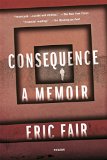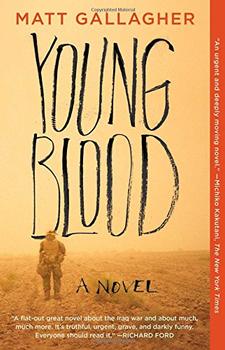Summary | Excerpt | Reviews | Beyond the book | Read-Alikes | Genres & Themes | Author Bio

Debut novelist David Abrams retired from the army in 2008 after a 20-year career as an award-winning military journalist. He was deployed to Iraq in 2005 as part of the army's public affairs team, and his book, Fobbit, is a comedy based on his experiences while there.
Set in Iraq during Operation Iraqi Freedom, the United States' invasion and subsequent stabilization of that country (2003 - 2011), the novel's action unfolds primarily at Triumph, the Forward Operating Base in Baghdad. An FOB (see "Back Story") is where non-combat staff - computer operators, military strategists - are employed. Military journalists charged with putting the happiest face possible on all news from the front, are also housed here. The troops on the ground responsible for rooting out the insurgents - the "door-kickers" - use the term "Fobbit" somewhat derisively to refer to these desk jockeys who never leave their cubicles at the FOB.
In Fobbit, alternating chapters follow four individuals as their careers intersect: Lieutenant Colonel Vic Duret, a war-weary battalion commander who has seen it all and would like nothing better than to return home to his wife and dog; Captain Abe Shrinkle, a mistake-prone commander who would make a much better Fobbit than soldier; Lieutenant Colonel Eustace Harkleroad, head of the Public Affairs Office, a Fobbit who thinks he'd be excellent in action but in reality commands no respect from even his Fobbit staff; and Staff Sergeant Chance Gooding, a journalist responsible for putting a positive slant on casualty reports and who is quite content being a Fobbit. Gooding is by far the most sympathetic character and the one readers come to commiserate with and understand the most. One gets the feeling that Gooding is the author's stand-in, the one who most closely echoes Abrams's own Iraq war experiences. It is Duret though who channels Abrams's thoughts about the war, constantly reflecting on the absurdity and futility of his mission.
Duret ground his teeth, molars squeaking, when he thought of the ridiculous redundancy of his time here in Iraq. Another Day, Another Bomb…[He] and his men spent their days running from one molehill to the other, whacking anything that moved with their amusement-park mallets. He'd picked that up from his soldiers – Whac-A-Mole – and soon was letting it slip into his daily reports, much to the grunting, frowning consternation of Colonel Quinner. But Quinner could go choke himself with all his esprit de corps Thoughts for the Day, as far as Duret was concerned. Quinner wasn't out here running around with a hammer, was he? No, that would mean leaving the security of air-conditioning and neatly patterned workdays. And Colonel Quentin P. Quinner was, despite all his bluster and blather to the contrary, nothing but another card-carrying member of the Fobbit Club.
Fobbit will likely garner a lot of attention, and might even be deemed unpatriotic, because its critical view of Operation Iraqi Freedom will be considered controversial by some. However the book's stance shouldn't detract from the quality of Abrams's writing. Not only does he do a remarkable job of conveying his characters' attitudes about the war, he also paints a picture-perfect sense of atmosphere as well.
Today, as Duret walked along the gilt-edged passageway that led to his brigade's area of operations in the east wing of the palace, he saw two men playing Frisbee. They were tossing the disk back and forth – rather sloppily – and it banged against the walls and the thick marble columns, then landed in the goldfish pond Saddam had built in the middle of the foyer. The two officers laughed as they scooped the Frisbee out of the water and kept tossing it, sprayed droplets catching the sunbeams that knifed through the overhead windows.
Humor is a subjective thing; Abrams's book is very darkly funny and cynical. It is also extremely gritty - lots of profanity and bloody body parts one might expect in a 21st-century war book. So this novel will not appeal to everyone.
Fobbit has been equated with Kurt Vonnegut's Slaughterhouse Five and Joseph Heller's Catch-22, and the comparison holds up surprisingly well. It's almost certain that a reader who found these books subversive or simply not funny, won't like Fobbit either. But readers who enjoyed Slaughterhouse Five or Catch-22 will find Fobbit a welcome addition to their libraries.
Abrams has had an ongoing blog for many years and has also had his short stories published in literary magazines such as Esquire, Narrative, and The Literarian. He is certainly a master of the short form, but his skill as a novel writer is still developing. Fobbit seems somewhat episodic at times; there's an overarching plot, but it sometimes feels more like an excuse to connect loosely related scenes. This is borne out by the book's ending, which really isn't much of an ending at all - what plot there is just kind of stops. Still, this book's purpose isn't necessarily to tell a cohesive story; it is to convey what it was like to work in this particular war zone and to illuminate the sometimes absurd nature of war. Abrams's use of satirical fiction in the novel with over-the-top characters and situations achieves these goals far better than a nonfiction account might.
Readers looking for an excellent novel about the inner workings (and follies) of Operation Iraqi Freedom will find much to enjoy here; Fobbit may well be considered a classic of the genre by future readers, and it's a must-read for fans of war fiction.
![]() This review
first ran in the October 3, 2012
issue of BookBrowse Recommends.
This review
first ran in the October 3, 2012
issue of BookBrowse Recommends.

If you liked Fobbit, try these:

by Eric Fair
Published 2017
A man questions everything - his faith, his morality, his country - as he recounts his experience as an interrogator in Iraq; an unprecedented memoir and "an act of incredible bravery." (Phil Klay)

by Matt Gallagher
Published 2016
Jarhead meets Redeployment in a suspenseful and smart fiction debut that has been called "thrilling, tragic, and darkly funny" by National Book Award-winning author Phil Klay.
A library is a temple unabridged with priceless treasure...
Click Here to find out who said this, as well as discovering other famous literary quotes!
Your guide toexceptional books
BookBrowse seeks out and recommends the best in contemporary fiction and nonfiction—books that not only engage and entertain but also deepen our understanding of ourselves and the world around us.